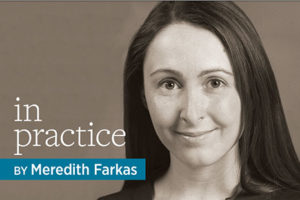
By the time I reached the final year of my MLIS program, I had never worked in a library before. I knew that I wanted to get as much experience in the field as possible to help with my job search but I wasn’t sure how.
Most library internships allow for experience in one area. Choosing between a public library and an academic library meant I would learn practices and policies unique to that particular type of institution. Thankfully I did not have to make that decision. I came across an opportunity for a dual-library internship, applied, and was selected.
The internship, based in Douglas, Georgia, allowed me to split my time between the Satilla Regional Library System and the William S. Smith Library at South Georgia State College. My 30 weekly hours were split evenly between locations: Mondays and Tuesdays at the academic library, Thursdays and Fridays at the public library, and Wednesdays were divided down the middle. This schedule allowed me to get a good deal done at one job before switching over to the other without feeling like I was juggling responsibilities.
The advantages of my internship were obvious; I absorbed a variety of skills at two distinct workplaces. At the academic library, I learned how to catalog, create online content with LibGuides, assist students with reference inquiries, and perform duties at the circulation desk. I helped create an online library instruction guide and helped teach and assess an information literacy class. At the public library, I learned procedures for circulation, shelving books, interlibrary loan, and patron computer and printer usage. I taught a series of computer and technology classes that I codesigned, and I took a role in collection development by using bibliographies to select materials for the reference and nonfiction sections.
Strong communication is necessary for dual-library internships, as is resource-sharing.
Some of the experiences overlapped, but systems and user populations were so different at these two libraries that the jobs really required two separate skill sets. The circulation software and cataloging classifications were different, as was teaching digital-native college students compared with older adults from a rural community, some of whom were not familiar with how to use a computer mouse.
That’s not to say there aren’t challenges that come with a dual-library internship. Getting half the time at each location, I learned only the basics. Students who take on dual internships should be prepared to manage shifts wisely and deal with multiple assignments at once.
Still, the positives outweigh any drawbacks, and I came to believe that dual-library internships are something all library schools should consider. They may not be logistically possible for every school, perhaps because of funding or lack of available positions, but administrators should at least explore partnerships with public and other academic libraries; school libraries that serve K–12 students; and even museums, archives, and special libraries, including law, medical, military, or church libraries.
Coordinating work schedules and projects for interns may be difficult, so strong communication is necessary, as is some type of resource-sharing. For example, I was provided low-cost housing by being able stay in the dorms at South Georgia State College.
The point of an internship is to gain experience, not proficiency; to give aspiring professionals a foundation that, along with a strong education, can be built on during a career. My internship opened up more options for me career-wise, and I now feel confident in applying to both academic and public library positions.
Though, if you’re wondering, I think academic libraries interest me a bit more—I enjoyed providing instruction to undergrads and making them aware of the immense databases, archives, and special collections available to enrich their educations. More library students should have this opportunity to get a well-rounded view of librarianship and find out what about the profession truly interests them.


